Who is still buying the US debt is an increasingly important question. Here are the foreign investors.
By Wolf Richter for WOLF STREET:
The recklessly ballooning US national debt is now just a hair away from ticking over $35 trillion. It has ballooned by $2.33 trillion in 12 months, even as the US economy was growing at a fairly strong pace. We don’t even want to know by how much it will balloon during the next recession when tax receipts plunge and expenditures explode.
The question on our worry-list is how long foreign investors will continue to support this recklessly ballooning US Treasury debt. So far, there has been solid demand as documented by the relatively low yields on longer-term debt, with the 10-year yield at 4.2%, while the Fed’s short-term rates are between 5.25% and 5.5%. A lack of demand would cause the yield to jump until enough investors find it appealing and buy it.
Foreign investors play a huge role in that demand.
Treasury debt held by all foreign entities rose by 1.1% in May from April and by 9.0% year-over-year (+$671 billion), to an all-time high of $8.13 trillion, according to Treasury Department data this afternoon (red line in the chart below). In summary, the biggest:
- Top six financial centers: $2.37 trillion, +13.4% YoY (blue) – London, Belgium, Luxembourg, Switzerland, Cayman Islands, Ireland.
- Euro Area: $1.60 trillion, +14.8% YoY (gray). Includes Belgium ($313 billion) and Luxembourg ($385 billion), the largest two holders, also included in the Top Six Financial Centers. France is the #3 holder ($283 billion).
- Japan: $1.13 trillion, +2.9% YoY (yellow). But Japan’s holdings dropped sharply in the last two months as the Ministry of Finance sold Treasury securities to buy yen to prop up the yen, to keep it from collapsing further. More in a moment.
- China and Hong Kong combined: -7.3% YoY, to $986 billion (purple), up a tad in May from April.
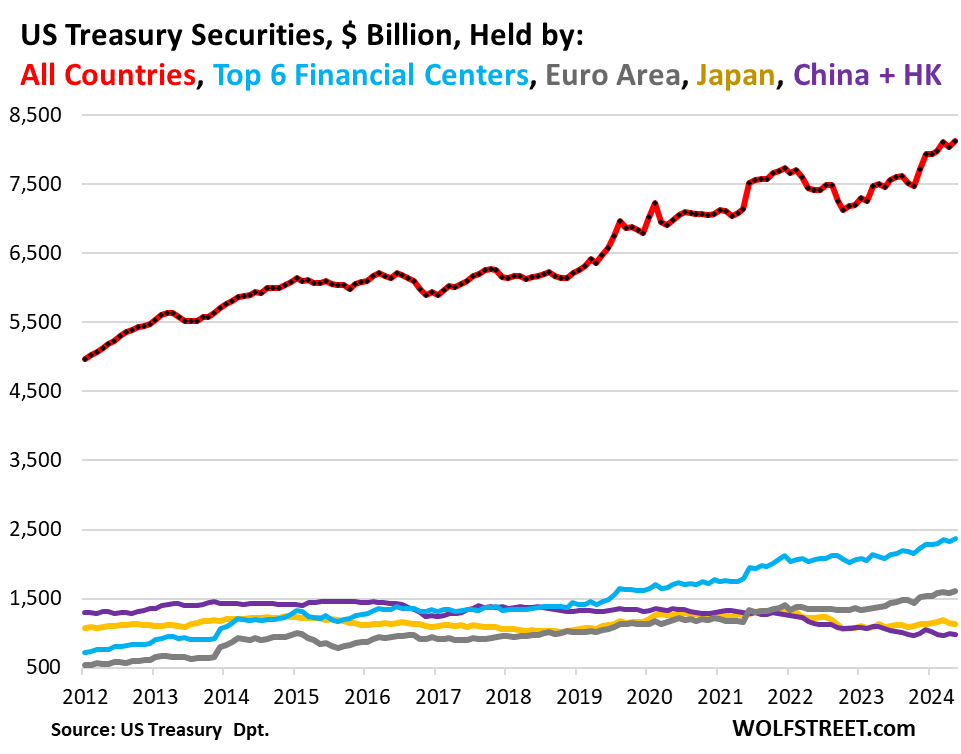
The share of foreign holdings.
While foreign investors have continued to increase their holdings of Treasury securities over the years, the US debt has grown faster, and so the share of the debt that is held by foreign investors declined for many years, from a share of 33% in 2015 to a share of 22% at the low point in October 2023.
In recent month, the share of the debt that foreign investors are holding has risen. In May, it rose to 23.4%, the highest since May 2023:
In percentage terms, US debt financing has become far less dependent on foreign holders than back in 2015 when one-third of the US debt had been sold to foreign investors. And it has become far less dependent on China and Japan; more in a moment.
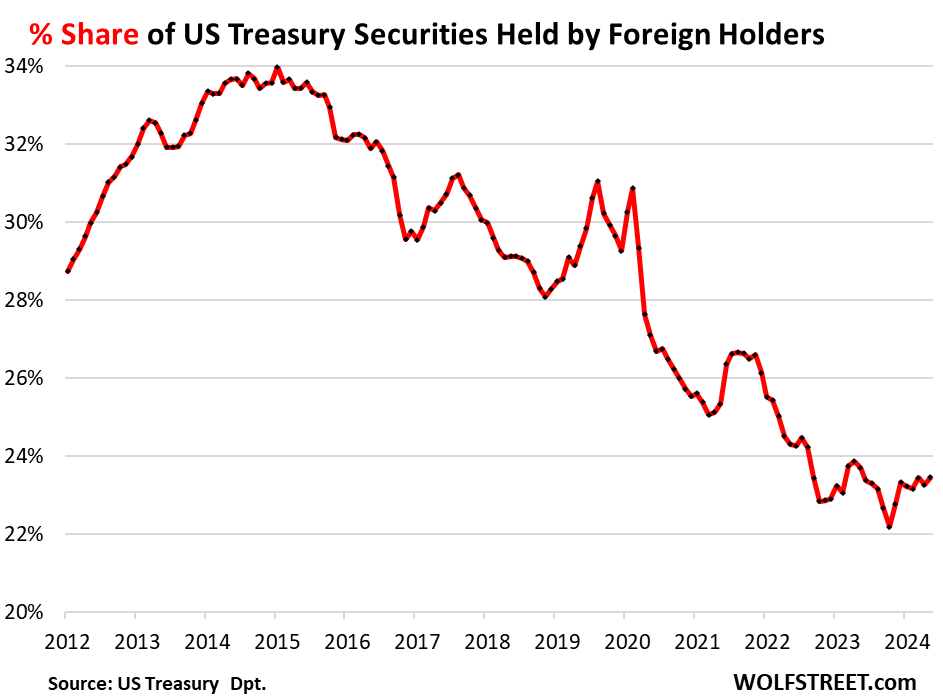
The six largest financial centers: +13.4% YoY to a record $2.37 trillion, having more than tripled since 2012! They are the UK (the City of London), Belgium, Luxembourg, Switzerland, Cayman Islands, and Ireland.
These countries specialize in handling the financial holdings of global companies, individuals, and governments. Ireland is a favorite for US mega-corporations to store their profits. So some of the holdings at these financial centers are actually held for US entities, and not foreign investors.
- UK: $723 billion
- Luxembourg: $385 billion
- Cayman Islands: $336 billion
- Ireland: $318 billion
- Belgium (home of Euroclear): $313 billion
- Switzerland: $290 billion.
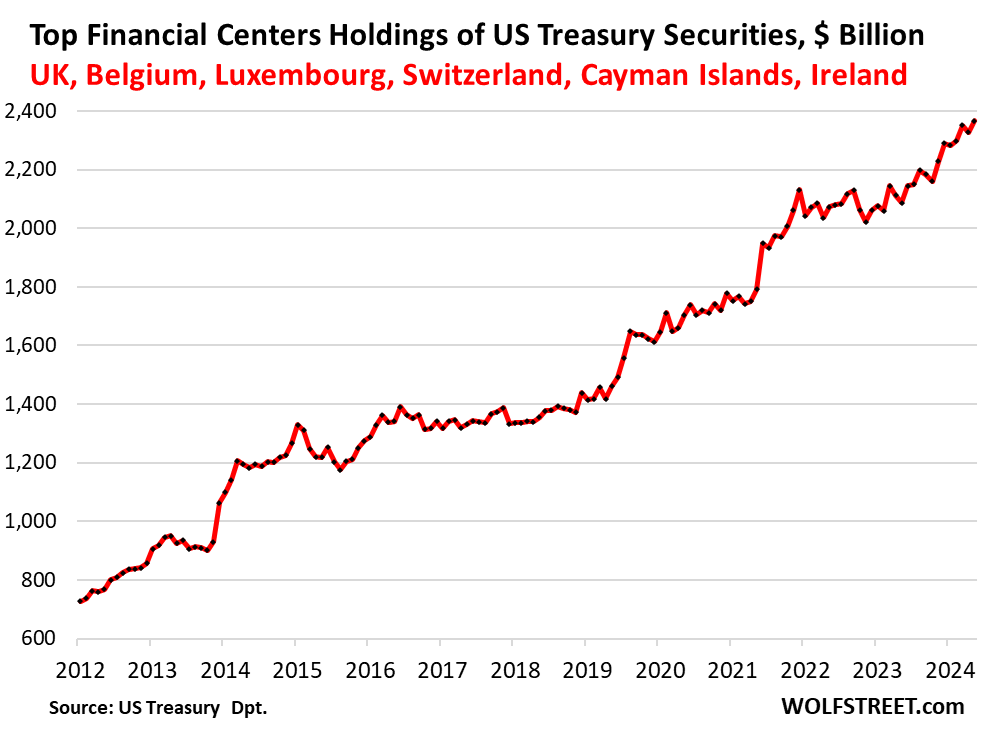
Euro Area v. China + Hong Kong.
China and Hong Kong combined have reduced their holdings from $1.45 trillion in 2015 to $986 billion now (blue). YoY, their holdings fell by 7.3%, or by $77 billion.
The countries of the Euro Area bought US Treasury securities hand-over-fist, tripling their holdings in 12 years, from $534 billion in 2012 to a record $1.61 trillion now (red).
YoY, the Euro Area’s holdings surged by 14.8% or by $207 billion, far outpacing the decline in holdings of China + Hong Kong!
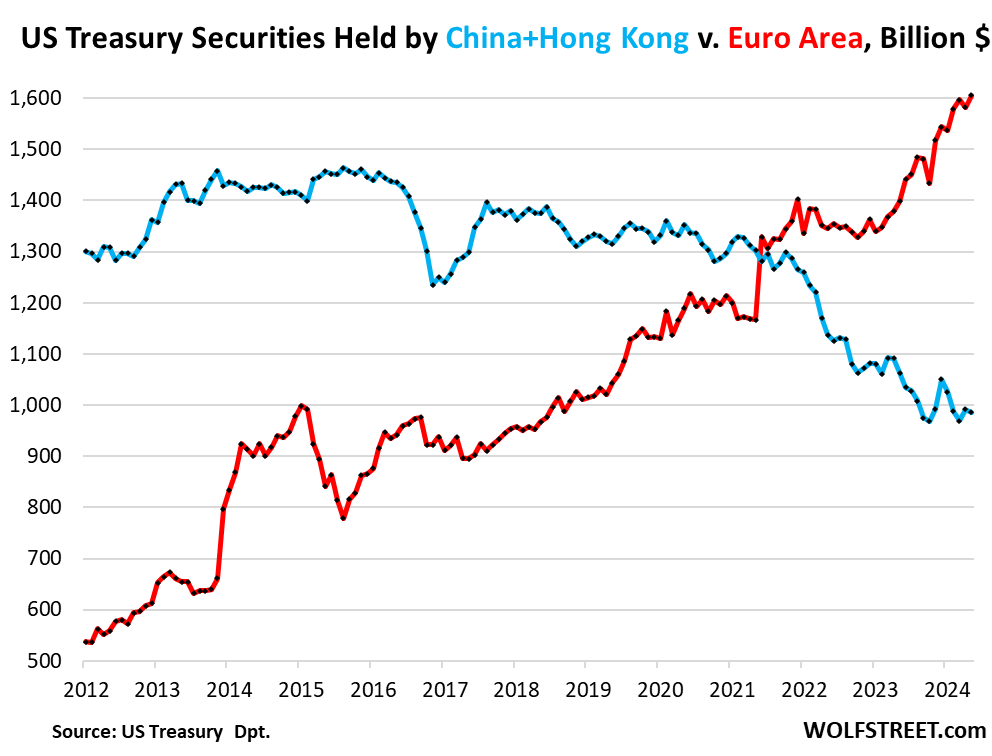
Japan’s holdings: +2.9% YoY, or +$32 billion, to $1.13 trillion.
Propping up the yen: In April and May, holdings plunged by $60 billion. Japanese authorities later announced they blew $62 billion in the foreign exchange market in April and May, selling USD and buying JPY, to prop up the yen and to prevent it from falling through the 160 level. And it worked in April and May. But in June, the yen fell through the 160 level anyway.
There are reasons why the yen has lost over 50% of its value against the US dollar since 2012, a big portion over the past two years (we discussed the reasons here, including why the collapsing yen is not good for Japan, which is why authorities are trying to reverse it.
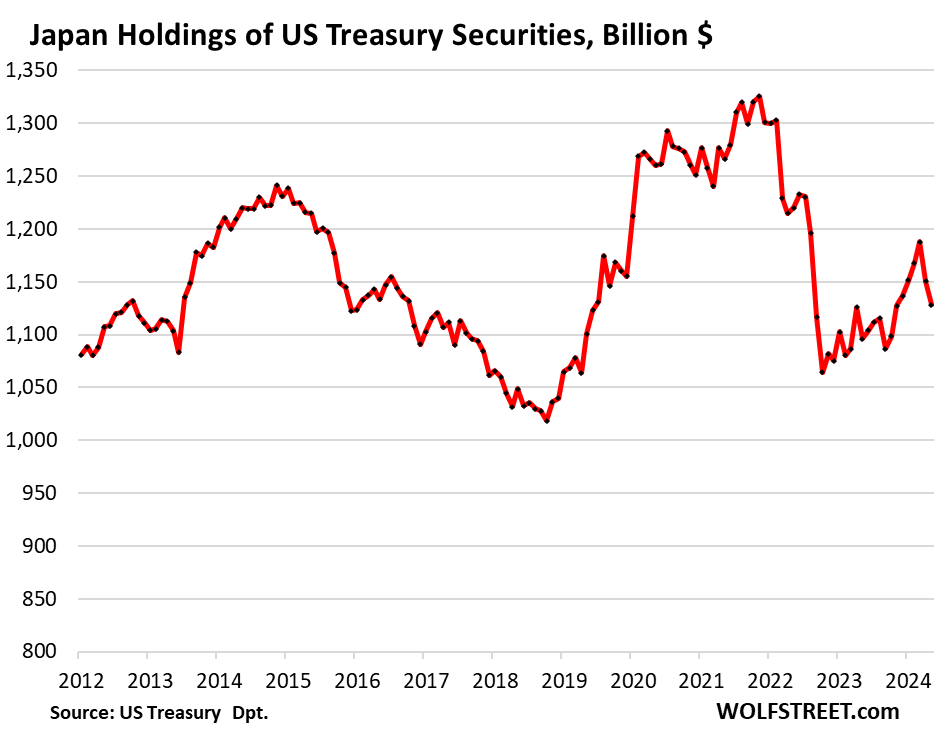
United Kingdom: $723 billion, +19.3% YoY. Included in the Top Six Financial Centers. The City of London is one of the top financial centers in the world, and so a portion of those securities could be held for US clients.
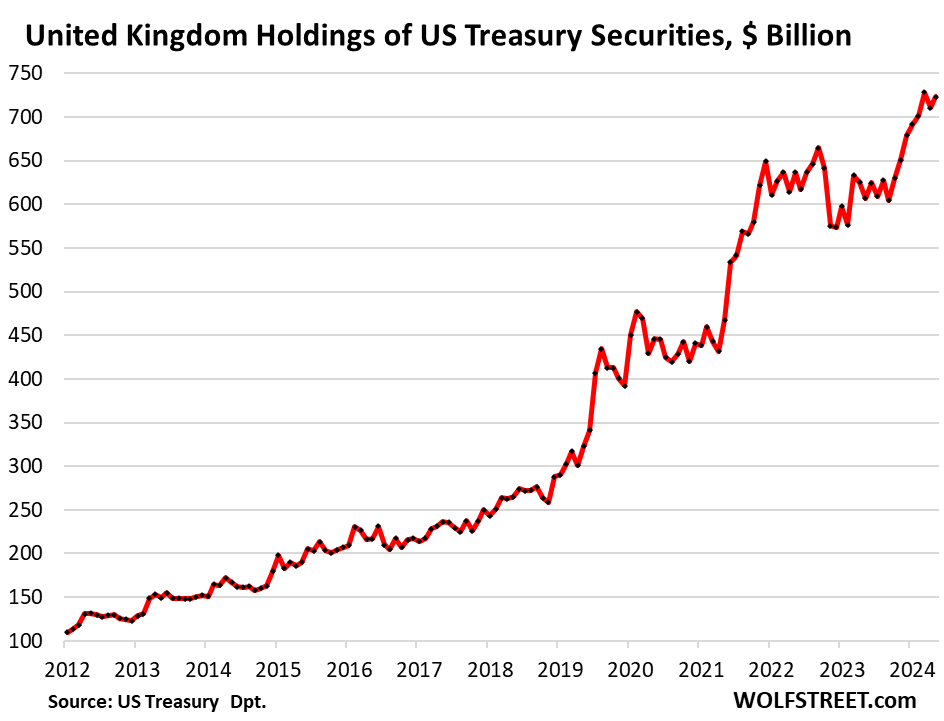
Canada: $354 billion, +33% YoY. Since March 2021, holdings have surged 233%, from $106 billion to $354 billion now. Over the past 12 years, holdings multiplied by 7!
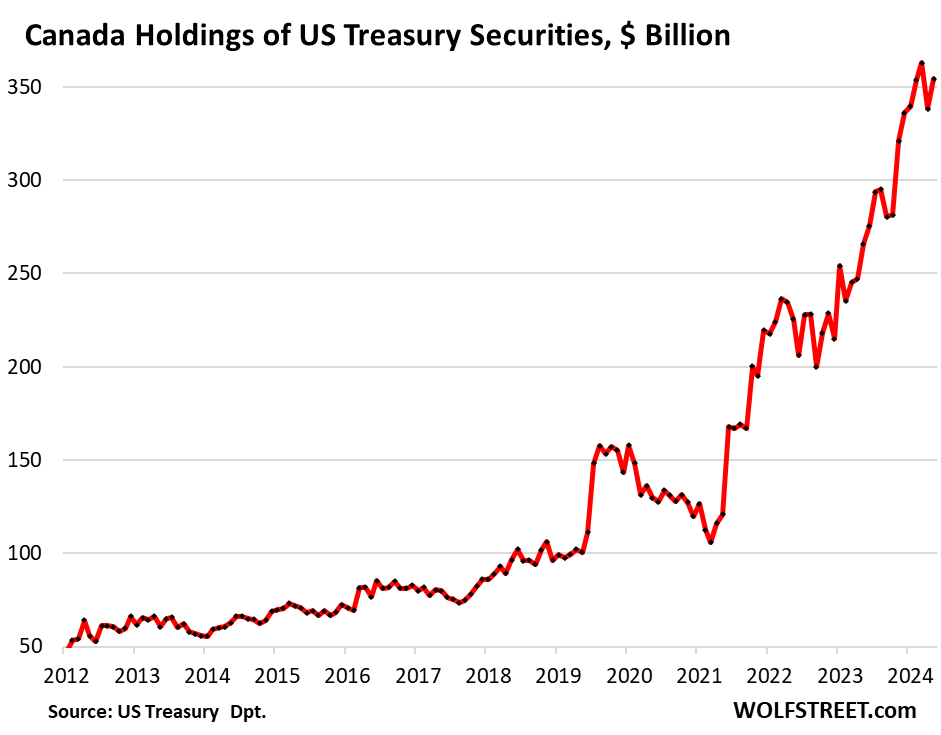
Taiwan: record $263 billion, +9.8% YoY:
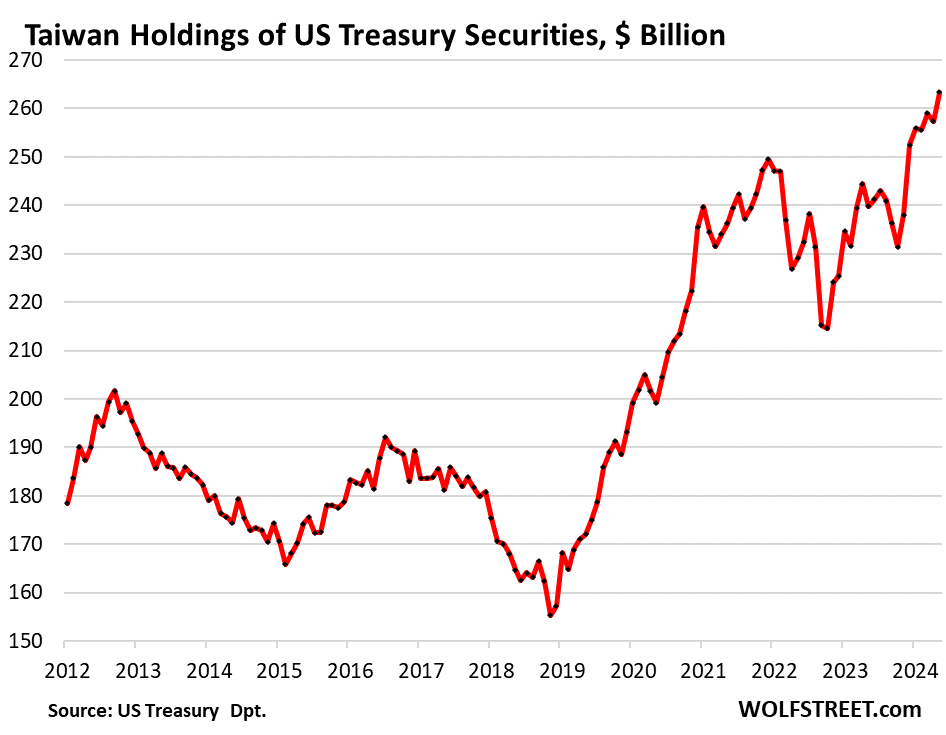
India: $238 billion, -0.2% YoY. Treasury holdings have multiplied by 6 since 2012:
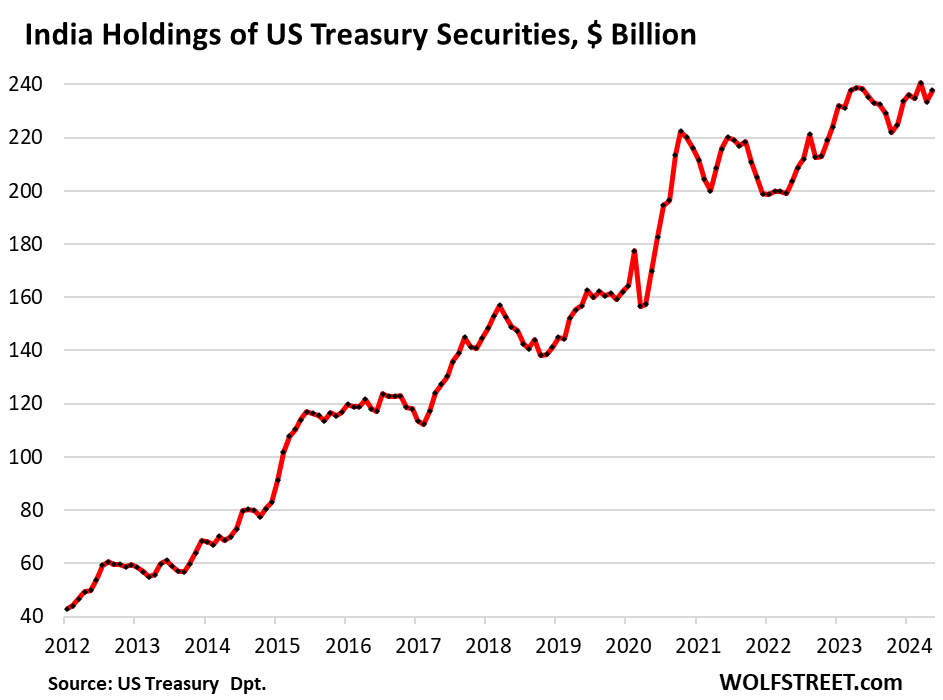
Brazil: $223 billion, -3.0% YoY. Between 2018 and 2021, Brazil cut its holdings by about one-third. Since then, its holdings have stabilized.
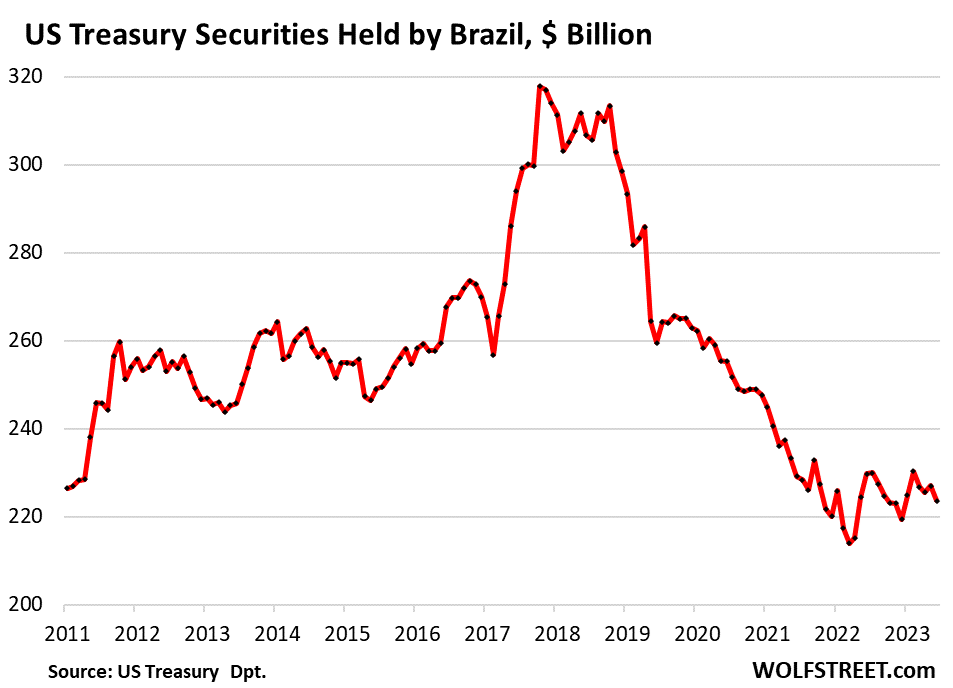
Enjoy reading WOLF STREET and want to support it? You can donate. I appreciate it immensely. Click on the mug to find out how:
![]()


Finance YouTubers about to get millions of views for distorting this data to fit their scary video title.
I think bag holders is the word you are looking for Wolf.
Lots of commenters here hold Treasuries, including me. Why “bag holders?” What kind of silly reference is that?
Ha ha! Your whole article implies that this cannot go on forever. China is leading the exit. It will eventually get crowded, when, as you predict, the next inevitable recession requires massive borrowing, just to stave off hunger, not to create an illusion of prosperity for political reasons.
First will come the end of our vaunted liquidity, next the necessity to raise rates to attract enough buyers, which, of course, will strangle credit-starved business and consumption.
The safest investment will become the least safe, and those of us long on US Treasuries will, indeed, be left holding the bag.
This can indeed go on forever – at the right prices. If interest rates rise in the market, people on the sideline start to get interested.
There was a ton of demand for 10-year treasuries when they hit 5% interest last fall.
Bill Shortell,
My article implies no such thing. It’s your wishful thinking that implies that.
At this level of holdings, there are political relationships involved.
You typically don’t get away with leaving the 6 largest financial centers “holding the bag”.
Maybe they lose a little money, but if the amount gets too big, there’s political repercussions. There’s also likely concessions involved.
Institutional investors have different incentives in front of them, compared to individual small investors.
re: “the next inevitable recession”
Gov’t spending is preventing a recession.
The US treasuries are probably the safest in the world. The Government has over $200 trillion in assets. (buildings, land, forest, oil rights)
Many other countries do not. Canada and its resources is probably one of the better currencies because of its asstets.
The US Gov could sell all its Alaska land and pay of the debt.
But, the increasing deficit is devaluing the USD. Right now, I am not sure if 5% actually beats inflation even though the fed says it does. The Government is increasing debt by 10% per year yet inflation is only 3.5%?
You have to look at US Treasuries as the last paper or “digital” asset that will still be around right before the lights go out. The US Treasury will always be able to sell debt to private investors, the Japanese/Chinese/UK, or the Fed. The interest rate may vary. But when the debt matures the holder WILL get more “dollars” in their account. The debt may climb to $40T, $60T, or $160T a hell of a lot faster then anyone thought it would but you’ll get those dollars.
The moment that doesn’t happen this entire system ends and people aren’t going to be worried about stocks and bonds and interest rates anymore.
Bill, You can’t be a bag holder. You will get the face value.
I’m assuming they change the inflation target eventually and this level of deficits necessitates higher rates, not lower.
You can look at US Treasuries from the perspective of the unsustainable deficits, the Fed purchases and sales, the shifts in foreign holdings, the dysfunctional politics, and you can make a case that the position is deteriorating, but compare US treasuries and the US dollar to other alternatives and they look very good, better than any other government issue. And behind each foreign holding there is a different story to explain shifts in holdings, my guess is that none of the stories are based on concerns over credit quality.
Keep in mind something like 40% of the Russell 2000 is losing money, and many can’t make principal payments on the debt.
The PE firms that loan these clowns money are also doing hybrid debt and sucking cash out via dividends.
If the market crashes, most of these guys are going to zero.
People buying in these stocks are bag holders.
Loaded up on TIPs in April–a 30-year ladder with plans to hold to maturity, with real yields 2.1-2.5%. The change in market value may be tough to see if LT rates spike, but mathematically this works for my retirement portfolio/future needs (actually makes early retirement possible), as long as Uncle Sam doesn’t default, which I still think is very unlikely.
Curious, no mention of Russian holdings since the glorious ’90s of the Clinton’s during the decade of the last man and the end of history.
Russia’s holdings are down to just $45 million, nothing essentially. Even before it invaded Ukraine, it was down to just $2 billion, also nothing essentially, too small to be listed here. Even at the peak (before they invaded Ukraine for the first time in 2014), Russia’s holdings were too small to be listed here. Brazil is the smallest holder on this list, with $223 billion in holdings.
U.S. bond holders will not get back the original value of their holdings, even with interest added in. For evidence, David Rosenberg, among others, makes this point repeatedly. If the interest paid were truly accretive, then the U.S.government would eventually be unable to pay the interest. Is my logic coherent?
What he means is that US “Senorage” is ending. You know when China sends us a car, we send them $ Bill’s and they buy treasury securities. We got a car, they got paper saying ‘ in God we trust” This con finance the USA for many years
Now it is over.
“Now it is over.”
Yes, 100% tariffs on Chinese EVs. We keep our Treasuries, and they keep their EVs.
Howdy Folks. Bubba and Buffett is buying too.
4/6 of those financial centers are also US tax havens.
What’s going on in Canada to warrant such a change in holdings?
Maybe big investors are worried about the CAD?
Starting just after 2000 the Bank of Canada sold all their gold holdings. Guess this is what they bought instead. Bulk of the 45 tons was sold for under $400/oz before 2004, just before it tripled. Best and the brightest government traders
The Swiss sold about half of their holdings in the same time frame.
And these are the rocket scientists that we trust with our economy. Are all central bankers required to undergo a lobotomy to remove their critical thinking processes?
“…I’d rather have a free bottle in front of me than a prefrontal lobotomy…”.
-tom waits
may we all find a better day.
I put a lot of money into Mexican Pesos. Most Canadians just know America so they put money into American dollars. With the standard of living continuing to fall and the rich leaving Canada longer term the Canadian dollar has to fall. Penniless people emigrate to Canada while the people with money leave the country. That can’t be good for the Canadian dollar.
I now call it the Trudeau Dollar, just to remind myself.
Generally good news I’d say.
Why use a brokerage firm when you can buy treasuries directly from the government?
What is the strategy when buying bills, notes, or bonds?
To your #1: there are a few advantages of using a broker: you can buy Treasuries in the market when you want to; and you can sell the Treasuries when you need the cash or when you want to take profit on a trade.
If your intent is to buy at auction and hold to maturity you can easily bypass brokers and set up an account with the gov. But if you want to sell those securities, you have to transfer them to your broker first, and then you can sell them.
I would like to add here that my broker does not charge a trading commission for purchasing T-bills and if you hold them to maturity, he does not charge for that either.
Correct. Most brokers do that. And selling T-bills through your broker should be easy too. They’re very liquid. My broker doesn’t charge commissions for selling T-bills.
I once accidentally duplicated manually an order for T-bills that was already in the system due to an auto rollover. So I ended up with two purchases. So I sold those T-bills the same day, and the price difference between what I paid at auction, and what I got when I sold was minuscule, and there were no commissions or fees. Done online, and it was a breeze. T-bills are very liquid. There were lots of big buy-orders lined up for this very issue.
If you are only buying treasures and holding them til maturity then going to the government site is fine. What if you are buying other things (like stocks or options)? Or possibly selling those treasures before maturity?
I have been buying a lot of short term bills lately, but that money is backing up options I have sold on selected stocks (that probably won’t get exercised, but you never know).
As Wolf said, TreasuryDirect.gov is best for those of us who buy Treasury securities and hold them to maturity. If you are going to sell your Treasury security before it matures, then TreasuryDirect.gov may not be the best approach. So, the “correct” answer (whether to use TreasuryDirect.gov) depends on your needs.
Buying treasury ETFs through my broker is so much easier. Any transaction in and out settles T+1. I can borrow against them. I can elect to reinvest interest income. I can purchase any amount down to the $0.01 rather than $100. I can see in real time what percentage of my portfolio is invested in treasuries. All my tax forms can be summarized by one source come tax time.
@Doc,
I use both Treasury Direct and a brokerage (Fidelity). The only problem I have had with TD was when I entered my password incorrectly. I got locked out of my account and had to call customer support. I had to stay online for over an hour until I spoke to someone. She resolved the issue, and I was able to login to my account again. That only happened once in 5 years.
@Doc
in case you were wondering about ease of use of that extra layer of security buying directly from gov vs a broker.
Most bank these days provide online brokerage too.
Say you use Chase as your primary bank, you can easily set up a brokerage account in your same banking account portal, transfer 1k into it from your checking/savings an in 24h you have a brokerage account conveniently within your banking site.
I also thought of opening an account with TreasuryDirect when rates pushed close to 5%, mostly just to avoid a middle man risk, but the website was quite antiquated felt like a site from the 90s, what you would expect from a gov run site.
A think to keep in mind though is that brokerages tied to banks tend to be a lot more cautious and if you ever wanted to buy penny stocks (anything bellow $5 a share) you are better off using a dedicated brokerage like TD AMeritrade or whatever its called now Schwabs.
Best
I always thought that in good times countries should pay down and eliminate debt, in bad times borrow to keep supports in place for citizens. When in proper order…good times = surplus budgets and bad times borrow to keep the boats afloat.
None of this makes any sense. If debt is growing like this now, what on earth can be done when borrowing is necessary? I’m not a doom and gloomer, but I do understand what living within one’s means actually means.
It won’t last because this situation is unsustainable.
That is a Keynsian view. Many people agree with it.
Unfortunately it seems that in the U.S. that the plan is that in hard times the solution it to spend to support the economy, and then in good times the plan is to cut taxes and return money back to rich people and corporations.
Both drive up the debt.
Why do you think a country should retire its debt other than to reduce demand in the domestic economy as an inflation control measure? I can’t think of any other relevant economic purpose for such behaviour.
I know this is referred to as kitchen table economics and that countries are supposed to be/run differently, but I have not had any debt whatsoever for over 20 years. The world looks very different in this mindset. Take a natural disaster requiring billions, or maybe the west coast big one needing trillions. If the Govt is already tapped then say goodbye to any standing. England never recovered to any extent after WW2….and they were eclipsed by US industry, especially after so much was bombed and/or left behind as others tooled up. As for the ‘big one’, I have earthquake insurance. The deductible will be 20% of the awarded settlement. If that happens I would simply start rebuilding immediately and not have to wait years for additional financing or have to beg for others to help me out.
Above someone said in good times the taxes are lowered for the rich to have more. This is true. And why should people settle for that kind of behaviour?
Countries will not pay down their debt because different governments only get elected by making promises to a dumb and/or powerful electorate. Different stripes for different winners. Doesn’t make it right.
The only way Countries can pay down their debt is by increasing taxes. If debt is to be eliminated completely, then all the money the fed spends will need to come back, essentially a 100% tax.
Unless you know of any other way of how this would work.
There are two ways for countries to reduce their debt. One, as you note, is to raise taxes. The other is to spend less, at least in real terms.
Milei in Argentina is actually a libertarian economist. He acted the buffoon to get elected. He is spending less. I’m investing in Argentina.
Thats a correct thought.
Ever wonder why the countries that grow the most these days are the ones running huge deficits? It is not very hard to grow when using borrowed money.
I’d argue the “good” times in the US is because of a 2 trillion deficit spending. I’d argue that there might already be bad times in the US and the government is fighting it already.
I don’t know the exact numbers so feel free to check yourself, but last time I checked, the USD value the US economy is groing is fairly similar to the respective USD yoy deficit increase.
Keynes had it correctly. Govt spending in recession to lessen downward economic swing. When economy recovers increased tax revenues pay off that new debt.
Our pathetic Pols have screwed that up. When the economy recovers and tax receipts start rolling in….Pols think “oh, goodie, we have all this money to spend” and they NEVER pay down the debt. Both parties have painted America into an inescapable financial corner.
“In percentage terms, US debt financing has become far less dependent on foreign holders than back in 2015 when one-third of the US debt had been sold to foreign investors. And it has become far less dependent on China and Japan”
Wolf, higher share of US national debt holdings by foreign investors means more capital inflow into the country, which is good because it strengthen the currency and as consequence lower the inflation, which is an effect that is more than needed especially now. Also it finance the huge government spending, and this way it reduces the effects of Crowding Out, balancing the supply and demand for capital into the market, and lowering the overall level of yields. This is one of main advantages that the US has compared to the rest of the world, which gives the ability to US government to fuel huge fiscal spending (as a tool to boost economic growth) while keeping lower real yields due to higher supply of capital in the market, and also lower the inflationary effects of that huge fiscal stimulus, through stronger currency.
Second, the amounts you mention in absolute value doesn’t mean anything, what maters is relative value of those foreign holdings, which as you show have decreased from 34% in 2015 to about 23% now. It’s one of the main factors that is impacting the increase of the natural rate since 2015, which implies higher real yields and higher inflation rate.
Third, China and Japan, are the biggest holders of US debt as individuals countries, and no other country can compensate for them, not even a bigger economic entity as the EU. Regarding the EU, or any other entity to be able to compensate for the decrease of China and Japan holdings, it needs not even to increase its holding by the same amount that those two countries have sold, but also needs to increase its holdings even more to compensate for the overall increase in the US national debt, so the share of the foreign holdings to the overall debt doesn’t change.
So let’s become a bit more realistic and see the reality as it is. Treasury notes and USD are the most important assets of the US economy, and the current fiscal and monetary policy are significantly endangering the stability of both those assets and as consequence the stability of the whole US economy.
Your #2 paragraph: “higher share of US national debt holdings by foreign investors means more capital inflow ”
That’s not what I said. Read what I said. I said “dependent.” Dependent on China’s willingness to do anything, including funding US deficits, is a BAD thing. It sucks. Unless you’re a China troll (are you?), you’d know that.
Your #2 paragraph is also dumb for another reason in general: the interest that is paid to foreign holders does not get plowed back into the US economy – they use it to buy machines from Germany, companies in other countries, soybeans from Brazil, etc. Interest that is paid to US holders stays in the US, and much of it gets spent in the US, and it’s taxable in the US and earns the US government tax receipts. There are many reasons why an internally financed deficit is a much better deal for the US.
Your #3 paragraph: “…which implies higher real yields and higher inflation rate.”
That is homemade BS. It implies no such thing. It does not imply a higher inflation rate at all. That’s just your fake theory.
Your #4 paragraph: “Third, China and Japan, are the biggest holders of US debt as individuals countries, and no other country can compensate for them,”
This is the dumbest line of them all. 1. Look at charts, dude!!!! And 2. Are you so clueless about the Euro Area? You have no idea that it is a united economy, with a common currency, government, parliament, central bank, laws, trade policies, etc.? Duh.
It’s all politics. China is dumping UST because US foreign policy keeps interfering Taiwan affairs which is a big NO to China. In China PoV, why should they keep propping up the US debts if they are hostile to their sovereignty. Yellen visit was really trying to persuade China not to fire
Japan has become more hostile to China recently and US of course doing what they do best, offers guarantee. Unfortunately, the yen is at breaking point, Powell has proven NIRP is a bad policy, I don’t see how long they can be the top UST holder.
Europe/US/UK – I believe there are pressure from US to Europe buying their debts, due to the NATO + Russia tension. Nothing is free if you want our protection.
Is China selling UST or just rolling off? They have a lot of economic and financial challenges right now. Over 40 banks have gone bye-bye this year already in china. They need money to meet those challenges and its not about “propping the US up”.
Foreign reserve is not bank reserve. It’s not central bank’s money. It’s reserve held for the exporters’ trade surplus. Selling one type of reserve will only increase the other type of reserve. It cannot be used for domestic spending.
“The presence of Chinese holdings in Belgium’s Euroclear and possibly in Luxembourg’s Clearstream or the UK indicates a strategy of diversification rather than a complete exit from U.S. debt.”
Everybody in the world is trying to plan ahead and adjust positions — literally nothing to see here…
In other news…………
Got an email in the middle of the day on Thursday, June 18th, from Treasury Direct saying to log into my account to read read new important message in my account inbox. Tried to log in and I can’t, all I get is an error message and thought maybe there was a problem with my browser version or something like that. Then I see the updated news headline “Widespread technology outage disrupts flights, banks, media outlets and companies around the world.” Okay. Nice. So it’s probably not my browser.
Then, me little pea brain makes some potential dot connections……
One week earlier there was the news article headlines such as “World’s largest stolen password database uploaded to criminal forum”, and “10 billion passwords have been leaked on a hacker site. Are you at risk?,”
Nice. So anyway………. I haven’t shaved in a few days so maybe today I should. And it’s time for me to put the TP on it’s little holster in the bathroom instead of leaving it loose near the toilet. I’m glad to see corn on the husk in the grocery store again, is it coming from South America?
“RockYou2024: 10 billion passwords leaked in the largest compilation of all time”
Cool beans batman.
“How did the auto dealer outage end? CDK almost certainly paid a $25 million ransom”
I’m looking forward to when the Amish are seen as technological geniuses because they were able to see it’s fallibility when it was relatively primitive. All these geniuses we have and too few people can see that our technology is our downfall until it’s too late.
We are stuck in the greatest circle jerk of all times.
Praise be to the technological suicidal course we are on.
How’s everyone liking that plastic residue in their blood?
With all the lives we have saved and improved, we are going to devour the earth. We can’t use technology to invent our way to something greater than we already have, we’re just staying extra busy to get nowhere in a hurry. Well, more like go downhill in really shiny cool toys in a hurry while life is becoming more twisted and hollow.
Worshiping money and technology will get us nowhere. The keys to the universe are not to be found externally.
Have a nice day. Hopefully I’ll be able to log into my Treasury Direct account soon enough. Getting locked out of my account for about 4 months was no bueno earlier in the year. They didn’t believe I am who I am so I had to go get a paper signed by my bank and mailed it in and the fed f-ckery took months to clear the lock on my account. Hey geniuses of the United States Treasury, hows about force people to verify who they are before they transfer most of their money into your account and then you lock it up for over a third of the year with zero fucking interest payment on it if you really need that paperwork. I think it was a trap to get interest free money sucked out of the money supply.
Middle finger to the morons who run this circus.
Great post! Lots of truth here! And I agree about Treasury Direct. That’s why my T Bill purchases at auction are done with a click through my broker’s site.
Oh, the Social Security site now won’t let me log into my account without creating an IDMe and another kind of account. How nice. What was wrong with my credentials before they made that decision? I pity the older folks that are not computer savvy.
According to the Big Guys, AI will save us all, but take away our jobs!
Cupcake – “Middle finger to the morons who run this circus.” You’re damn right. I feel that this world is an onion of dysfunction, corruption, and incompetence. Every day a new layer. Microplastics, a burning world, vast computer hacks and heists daily, astronauts trapped on a dying space station, a government that at best has checked out and completely abdicated any function in even paying lip service to making things better. This is so messed up on so many levels. These morons are psychopaths. As pvt Taylor said in Platoon, Hell is the impossibility of reason.
IMO, every bit of life has been on the thin crucial existential edge for every moment since the first organisms emerged and started struggling in the primordial ooze. At any given moment, I individually may feel closer to or further from that edge. But I, and you and all, will tip over it soon enough. Anybody who thinks they are not gazing over that edge at eternity is fooling the self. That’s my everyday, and I am having one of the best seasons of my life. How? By mostly self-adjustments. The situation is still the situation. Enjoy it! You already won the most infinite lottery imaginable.
That fourth chart is telling. Definitely looking more and more like a west versus east world.
Not quite. India has been getting huge as buyer – see second chart from bottom. China has massive economic and financial problems, including trillions of dollars in hidden debts taken on by provincial and local governments and a collapsing real estate development sector. They’re doing everything they can to keep the plates spinning.
Wolf, do you think China will cause the next major financial crise?
No, because a financial crisis means “financial panic” when people and institutions yank their money out of banks and other financial institutions and they begin to collapse. A government can prevent a financial crisis by controlling everything or backstopping everything — which China is pretty good at. The four largest banks are state controlled, as are large brokerages, companies, etc.
Great data, as ususal.
What I most fascinating is not who’s buying US debt, but Japan and why. Demographic factors are working against Japan and there might not be a solution, except a controlled unwinding of their economy. Or something.
Terra incognita for economies (but among others, e.g. Italy).
I was about to say something about improving labor efficiencies and automation, and then I went and looked at their per capita GDP – which has remained fixed for the last 30 years. Of course, this is skewed by their high number of retirees, but that number needs to start heading up. Believe it or not, they have fallen so far behind the US in this vital statistic that they aren’t even 50% of our per capita GDP.
Japan is not interested in winning the labor efficiencies metric game at the macro level. Their society cherishes work and seems to suffer extensive mental health issues without it. As such, they choose to seek higher employment for the good of their society over metrics that boost profits at the macro level.
At the micro level, there are various industries where Japan is at or near the top of efficiency metrics. There ability to automate and do so with a high level of quality has been well documented for a minute now.
“Their society cherishes work and seems to suffer extensive mental health issues without it.”
Japan seems to have mental health issues WITH it — it has one of the highest suicide rates in the developed world. Leading cause of death for young working-age males.
What is the supposed problem here? There’s no solvency constraint, so that can’t be it.
Is the concern potential inflation risk?
Meanwhile, one party wants to spend more and the other wants to keep cutting taxes without reducing spending (despite saying they want to). We need politicians that are more concerned with getting things done than creating problems to use as political fodder.
In the current political climate, scoring media points for your team is more important than anything else. In fact, nothing else matters because politics is now purely entertainment.
Politics is now really the biggest business in the world.
DM: Microsoft CrowdStrike meltdown sparks mayhem – Huge hospital group is forced to cancel surgeries as thousands of flights are grounded and New York Subway control room loses track of its own trains
Global outage sparks chaos across the globe, with TV channels, airports and banks knocked offline. The technical fault has caused Windows computers to suddenly shut down, prompting departure boards to suddenly turn off at airports across the world.
DM: Meet the mysterious multi-millionaire at the heart of a worldwide tech crisis – as ‘Global President’ Michael’s recent, rather awkward interview emerges
Melbourne man Michael Sentonas leads CrowdStrike, the publicly-listed cyber-security firm that caused the computer meltdown felt across the globe.
8:38 AM 7/19/2024
Dow 40,240.63 -424.39 -1.04%
S&P 500 5,511.59 -33.00 -0.60%
Nasdaq 17,744.95 -126.27 -0.71%
VIX 16.25 0.32 2.01%
Gold 2,406.00 -50.40 -2.05%
Oil 81.70 -1.12 -1.35%
CNN: What is CrowdStrike, the company linked to the global outage?
The global computer outage affecting airports, banks and other businesses on Friday appears to stem at least partly from a software update issued by major US cybersecurity firm CrowdStrike, experts told CNN.
CrowdStrike told customers early Friday that the outages were caused by “a defect found in a single content update of its software on Microsoft Windows operating systems, according to a post on X from CEO George Kurtz.
The company’s engineers took action to address the problem, according to an advisory viewed by CNN, which told customers to reboot their computers and perform other actions if they were still having technical issues. The issue is specific to Falcon, one of CrowdStrike’s main software products, and is not impacting Mac or Linux operating systems, according to the advisory. Crowdstrike says Falcon is designed to protect files saved in the cloud.
CrowdStrike’s cybersecurity software — used by numerous Fortune 500 companies, including major global banks, healthcare and energy companies — detects and blocks hacking threats. Like other cybersecurity products, the software requires deep-level access to a computer’s operating system to scan for those threats. In this case, computers running Microsoft Windows appear to be crashing because of the faulty way a software code update issued by CrowdStrike is interacting with the Windows system.
The company said the outage was not caused by a security incident or a cyberattack. Kurtz, in his post, said the issue was identified and isolated, and engineers deployed an update to fix the problem.
CrowdStrike’s (CRWD) stock fell 10% in premarket trading.
Belgium & Luxembourg are pretty small potatoes, why are they such big buyers?
Luxembourg is a US tax haven along with Ireland, Switzerland, and the Cayman Islands. I imagine a lot of treasuries are ‘housed’ there.
Sure we can keep the party going. But how are we going to teach the US Fed Gov a lesson if we just keep the party going? I say it’s about time that all investors sit on their currency hoards and refuse to buy the debt of the Fed Gov. Only then will the Fed Gov understand the true power of our power.
When did Canada dump its gold holdings? I assume most of the money was reinvested in US Treasuries.
Since all governments with their own currency can print money 💰 at will, gold is for all purposes free to central banks. Central bank gold selling is brain dead. This is how Russia accumulated so much gold.
Seems like US Dollar debt is flowing west while gold is flowing east.
Everyone seems to be anticipating lower interest rates.
I have CD’s that are being called (another lesson about avoiding non-call protected CD’s)
But it doesnt seem like debt issuance will be declining materially. How much capacity does the G7/Euro area have for absorbing US debt.
The Fed continues to shrink the BS – what for ? To make room for the next QE and interest rate control program.
Seems like we have to continually reset our ideas about how long the can can be kicked down the road.
Interesting article !!!
Geopolitics aside, there are compelling financial reasons to hold short term Treasurys. They provide a decent rate of return and the dollar remains strong, at least for now. That is why Berkshire Hathaway owns over $150 billion of T-bills as of March 2024. I also own a bunch, but not as many as Berkshire. :-)
It will be interesting to see how the Treasury auctions go once the Fed starts lowering rates. That is when we may find out, as Wolf points out, that the law of supply and demand may not automatically work in the Treasury Dept’s favor when they try to sell their massive debt issuances at a less attractive rate of return. And that is also when we may find out whether the Fed steps in and starts re-expanding their balance sheet by purchasing more Treasurys to prevent “disruption” in the Treasury auction market. Which, of course, could potentially lead to a LOT more inflation. This, by the way, is the usual path of things in banana republics. Of course, the U.S. is the global reserve currency, most powerful nation on earth, blah, blah, blah. The U.S. also is the world’s biggest debtor nation. Why am I feeling that all of this may have a very bad ending?
“once the Fed starts lowering rates”
Big assumption you’re making there.
The rest of your 2nd paragraph explains exactly why the Fed will *not* cut: they know they could lose control of the long end of the curve, and they do NOT want to do QE again.
I am curious how much of the debt is being bought with the expectation of simply holding to maturity. I expect that well over 90% of 4-week T-bills are in this category, but I also expect that a lot purchasers of 10 and 30 year bonds would have an exit/hedging strategy at the time of purchase.